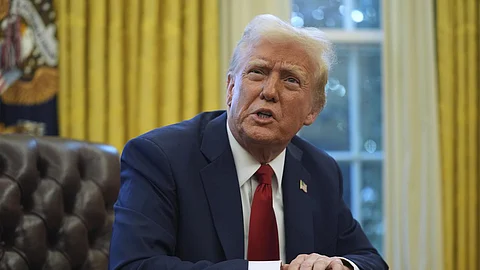
- Home
- Live Blog
- Breaking News
- Top Headlines
- Cities
- NE News
- Sentinel Media
- Sports
- Education
- Jobs

WASHINGTON DC: The order immediately drew backlash and legal challenges from expectant immigrant parents, immigrant rights organizations, and 22 state attorneys general. Federal judges responded by issuing nationwide holds, citing existing Supreme Court precedent and the plain language of the Constitution.
The US Supreme Court ruled 6-3 that lower courts overstepped their authority when they issued nationwide injunctions halting the enforcement of a Trump administration policy aimed at restricting birthright citizenship. While the ruling does not decide the constitutionality of the policy itself, it marks a procedural win for President Donald Trump and could make it more difficult for courts to block other controversial policies in the future.
The court’s decision held that lower courts must narrow the scope of their relief, allowing only case-specific rulings instead of blanket nationwide orders. “Relief must be limited to what is necessary for the parties involved,” the majority opinion said, criticising district judges in Washington state, Massachusetts, and Maryland for blocking the citizenship policy across the entire country.
This case stems from a bold executive order signed by Trump on his first day back in office, instructing federal agencies not to recognise as US citizens any newborns unless at least one parent is a citizen or lawful permanent resident. That directive directly challenged the long-standing interpretation of the 14th Amendment, which states that “all persons born or naturalized in the United States, and subject to the jurisdiction thereof, are citizens.”
However, the Trump administration sidestepped a direct legal battle over the constitutional interpretation and instead challenged the scope of judicial power, arguing that no single district judge should have the authority to block a federal policy for the entire nation. The Justice Department maintained that court orders should apply only to the plaintiffs involved in a given case.
“This kind of judicial overreach has gotten out of control,” the administration said in its emergency appeal to the high court. Trump himself echoed those frustrations on his social media platform in March, writing: “If Justice Roberts and the United States Supreme Court do not fix this toxic and unprecedented situation IMMEDIATELY, our Country is in very serious trouble!”
While this ruling is a procedural one, it could significantly affect how federal policies are challenged in court moving forward. Nationwide injunctions have become a common tactic for rapidly halting executive actions, particularly on hot-button issues like immigration, environmental regulation, and civil rights. Both Republican and Democratic administrations have expressed concern over the power of single federal judges to issue such sweeping orders.
Some Supreme Court justices have also criticised the rise of nationwide injunctions, though during oral arguments in May, they wrestled with how to limit their use without undermining the ability to provide effective legal remedies—especially in cases, like birthright citizenship, that inherently apply across the country.
Importantly, the Supreme Court did not rule on whether the Trump policy is constitutional, nor did it decide whether the 14th Amendment supports or prohibits restricting citizenship based on parental status. That broader legal question remains unresolved and is likely to work its way through the lower courts over the coming months. For now, the decision represents a strategic victory for the Trump administration, strengthening its ability to implement policy without immediate nationwide judicial interference. It also sets a precedent that could reshape the legal landscape for how presidential powers are challenged and constrained in the future. (Agencies)
Also Read: Trump hails 'giant win' after Supreme Court curbs judges' power to block his orders
Also Watch: